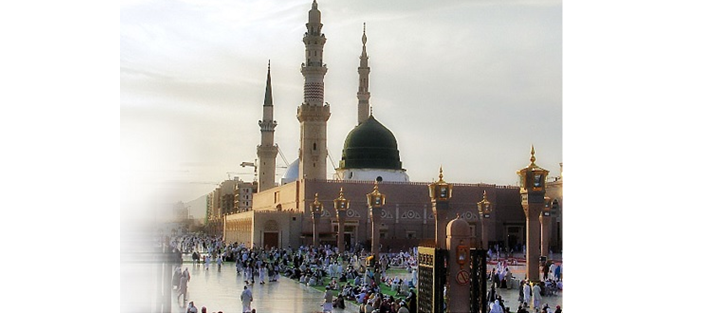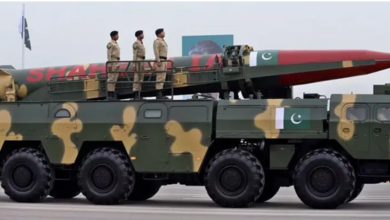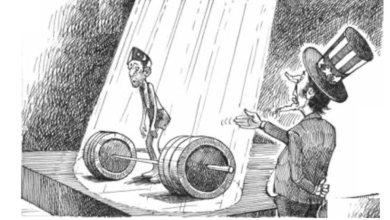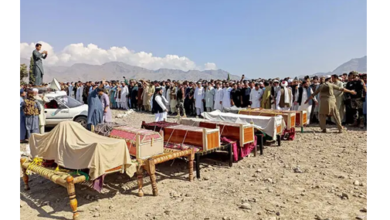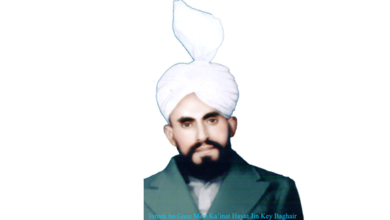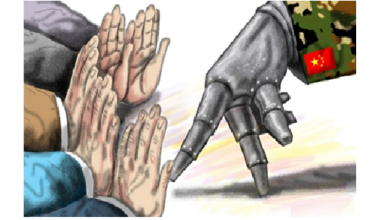Essence of Life and the Universe ﷺ
The Teachings of the Holy Prophet ﷺ and the Need for Global Justice
دل جس سے زندہ ہے وہ تمنا تمہی توہو
ہم جس میں بس رہے ہیں وہ دنیا تمہیں توہو
The desire that keeps the heart alive is you;
The world we inhabit is you.
And the true demand of the love for the Messenger ﷺ is that this condition fully encompasses our thoughts and actions. This is a matter of faith, and the evidence of faith can only be provided through righteous deeds. Regarding the sacred life of the Prophet ﷺ, we must believe that the era of the Prophet ﷺ is not just part of history but serves as a continuous source of guidance for all of humanity until the Day of Judgment.
Our Prophet ﷺ presented Islam as a complete social system, gifting it to all of humankind. The true revolution in human history is the blessed era of his prophethood. Through the Prophet ﷺ, humanity gained awareness of the vastness of life and the universe and received the message of global equality for humankind. Just as an individual human goes through various stages to reach consciousness, humanity as a whole passed through similar phases. The declaration of the finality of prophethood also signifies that humanity as a whole has reached maturity, which is why our Prophet ﷺ addressed all of humanity during his Farewell Sermon.
Thus, for the entire human race, God’s guidance has been preserved word for word, and a complete practical example of living a social life according to this guidance has been provided.
The “ideal” was transformed into the reality of social life, and life became a practical model. It became clear to humanity that the system of the universe, along with individual, collective, and social life, all fall under God’s law. In the universe, God’s sovereignty is direct, but due to the qualities of will and choice, God’s sovereignty in human life is enforced through faith and actions. The system of the universe operates under astonishing order. There is no room for corruption because corruption stems from polytheism, and polytheism is impossible in the universe. In Surah Al-Ambiya, it is stated:
لَوْ كَانَ فِيهِمَا آلِهَةٌ إِلَّا اللَّهُ لَفَسَدَتَا ۚ فَسُبْحَانَ اللَّهِ رَبِّ الْعَرْشِ عَمَّا يَصِفُونَ(الانبیاء:22)
Had there been within the heavens and earth gods besides Allah, they both would have been ruined. So exalted is Allah, Lord of the Throne, above what they describe.
Corruption arises from polytheism, which is why polytheism is an unforgivable sin; it denies the respect for humanity. Human polytheistic thoughts and actions do not affect the essence of God. Even if the entire world were to turn polytheistic, God would remain Praiseworthy in Himself. Polytheism leads to corruption in human thought, action, and society. Where there is corruption, peace and justice cannot prevail. To achieve welfare and comprehensive development in human society, it is essential to maintain peace and justice. Freedom, equality, brotherhood, trustworthiness, honesty, truthfulness, and justice—these qualities, which we refer to as moral values, are in fact the laws of nature. Their implementation guarantees peace and justice in human society. The more these qualities are alive, awakened, and active in an individual, the more that individual contributes to the establishment of good and welfare. The more such righteous individuals exist in a society, the more that society will become a cradle of peace, security, and justice.
A seed flourishes fully when it is given an open environment. If it is pressed or buried under a rock, it is deprived of growth. The Messenger of Allah ﷺ removed all the stones of human emotions, interests, desires, and biases from the initial Islamic society, and thus, that garden of human society flourished in such a way that history has no parallel. From this perspective, the life of the Prophet ﷺ is truly unmatched. The Holy Prophet ﷺ had the greatest authority but was the most bound by law. Everything could have been within the Prophet’s ﷺ reach, yet he lived the simplest life. Every command of the Prophet ﷺ was law, and he led the life of the greatest self-accountability. In this regard, the characteristics of Islamic society are unique. The only criterion for respect in Islamic society is personal character.
In an Islamic society, justice will be done even with enemies, and the one who makes a mistake or commits a crime will be the first to confess. There is no concept of humans ruling over humans in the Islamic system. Rather, those managing social affairs and resources are accountable to everyone for their actions and management at all times. The greatest obstacle to such a system is human desires. In Surah Al-Furqan, it is stated:
أَرَءَيْتَ مَنِ ٱتَّخَذَ إِلَـٰهَهُۥ هَوَىٰهُ أَفَأَنتَ تَكُونُ عَلَيْهِ وَكِيلًا(الفرقان:43)
Have you seen the one who takes as his god his own desire? Then would you be responsible for him?
Deprivation of Justice in Social Life
Deprivation of justice in social life gives rise to chaos and corruption. This state of unrest continuously stirs up people’s emotions and prejudices. Although force can temporarily silence people, this silence later turns into a storm of rebellion. The greatest reality of human life is that it is not mortal; human existence and identity persist even after death. The future life is inevitable for humans, and success or failure in that eternal life is based on the conscious, voluntary actions performed in this world under the light of faith. Belief in the Hereafter fosters the quality of self-accountability within a person. The constructive and destructive aspects of human society are not limited to specific generations, regions, or nations.
In the past fourteen hundred years, all global positive changes, the awareness of human rights, and the efforts to establish international organizations urging nations to adopt higher human values stem from the blessed era of the Prophet Muhammad ﷺ. The reality is that faith in monotheism opens the paths of goodness and welfare for humankind.
یہ پہلا سبق تھا کتابِ ہدیٰ کا
کہ ہے ساری مخلوق کنبہ خدا کا
“The first lesson from the Book of Guidance was this:
That all creatures are part of God’s family.”
Yet, obstacles to human unity and welfare continue to arise, and the conflict between truth and falsehood, good and evil, is an inherent feature of human society. Consequently, the forces that create chaos and disorder continuously pollute the atmosphere of peace and justice. Ironically, those who spread corruption often claim to be the reformers. The manifestations of chaos vary, but the Holy Quran declares that causing unrest is a greater sin than murder. Pharaoh is referred to as a corrupter, and the severity of corruption is attributed to the sinful actions of humans. History is the memory of nations and the mathematics of events. It repeats itself, revealing that God’s law never changes. The system of life and the universe consists of various components of human society, not divisions, but we have practically divided them ourselves.
Worship is separated from daily life, and we forget the Quranic command that multiple deities lead to corruption. Our guide, the Prophet ﷺ, entrusted us with the responsibility during his Farewell Sermon: those who were present must convey this message to those who were absent. This was a universal obligation. Additionally, the Holy Quran has entrusted us with the collective responsibility of being the “best community” and “a just nation.” In Surah Al-Anfal, it is stated, “Those who deny the truth invite one another to wrong. If you do not do the same, there will be great corruption in the land.”
Allama Iqbal reminded the Muslim Ummah of this very responsibility:
دنیاکوہے پھرمعرکۂ روح وبدن پیش
تہذیب نے پھراپنے درندوں کوہے ابھارا
اللہ کوپامردیٔ مومن پربھروسہ
ابلیس کویورپ کی مشینوں پربھروسہ
تقدیرِامم کیاہے کوئی کہہ نہیں سکتا
مومن کی فراست ہوتوکافی ہے اشارہ
“Once again the battle of spirit and body confronts the world,
Civilization has once again unleashed its beasts;
God has faith in the steadfastness of the believer,
While Satan places his trust in Europe’s machines.
What is the destiny of nations? No one can predict it.
Yet, a hint is enough for the insight of a believer.”
The energy of faith instils the quality of self-accountability in both individuals and nations. Unfortunately, we have been deprived of this quality globally for a long time, and this deprivation has also robbed us of the energy that Iqbal referred to as the “insight of the believer.” Nevertheless, our collective role in establishing global peace and justice remains critically important. Until we are capable of fulfilling that role, peace and justice cannot be established at the global level, and we will be accountable to God for this helplessness. The path to fulfilling this responsibility is illuminated by the love for the Prophet ﷺ, for he is the essence of life and the universe.
ہونہ یہ پھول توبلبل کاترنم بھی نہ ہو
چمن دہرمیں کلیوں کاتبسم بھی نہ ہو
نہ یہ ساقی ہوتوپھرمے بھی نہ ہوخم بھی
نہ ہوبزمِ توحیدبھی دنیامیں نہ ہوتم بھی نہ ہو
خیمہ افلاک کااستادہ اسی نام سے ہے
بزمِ ہستی تپش آمادۂ اسی نام سے ہے
“Without this flower, even the nightingale’s song would not exist;
Without it, the smiling buds in the garden of the world would not bloom.
Without the Saqi, neither wine nor the wine-cup would exist;
Neither would the gathering of monotheism exist, nor would you.
The tent of the heavens stands upright in his name,
The pulse of existence beats with the warmth of his name.”
May the name of my Lord remain, who sent my Prophet ﷺ as a mercy for all worlds!

